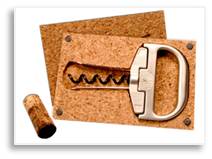This morning I got together with my friend of many years, Janet
Taylor. She is doing the marketing for
her father’s invention, The Durand, and
occasionally I consult on an informal basis.
The Durand is a vintage cork removal device that is designed
specifically to remove old or damaged corks from bottles of very good wine. It’s a devilishly clever design that works in
four simple steps to get that problem cork out without it crumbling or, worse,
falling into the wine.
 |
| The Durand |
The Durand’s target audience is sommeliers in fine
restaurants and wine stewards. It is also used by people
who own significant wine collections and invest in excellent vintages. If they ever brought up a case of wine from the Titanic, The Durand would be the tool for the job.
Ordinary folks like you and me can make do
with a $20 corkscrew. Although
I could be wrong about that. I mentioned
The Durand to someone I know who replied, “That costs less than the bottle of
wine I ruined last night.”
It seems to work well because the reviews and testimonials on the web
site are outstanding. Wine experts recommend
its use and sommeliers have been known to buy the device right out of the
demonstrator’s hands.
I thought of The Durand a few weeks ago when my husband was removing
the cork from a (non-vintage) bottle of 1997 William Hill Napa Valley Chardonnay. At least, he attempted to do so. Under the ministrations of our $20 corkscrew,
the cork crumbled and then broke.
Nothing he did could get it out of the bottle, so he finally pushed it
in.
I was unwilling to discard such a nice vintage but we also had not yet
unpacked any decanters. So I strained
the wine through a fine sieve into the only container I could find—a glass
juice bottle—and refrigerated what was left after dinner.
A few days later, my daughter and her family came to visit and see our
new home. When my son-in-law came in the
door, he looked frazzled so I poured him a glass of the Chardonnay and put the
container on the counter. We then became engrossed in playing with our
two granddaughters. A couple of hours later,
Number One Granddaughter announced that she wanted some juice and her sister
perked right up. The two of them toddled
off into the kitchen with their grandfather while I sat and talked to my
daughter.
 |
| Ceci n'est pas un
verre à vin
|
Two minutes later, Number Two Granddaughter, also known as Trouble
Baby, came back out with her sippy cup in her hand and a very odd look on her
face. I can only describe it as, “I don’t
know what this is or why you gave it to me but I don’t like it.” She handed the cup to her mother, who was
puzzled as to what her little one wanted.
Mom took the cup, unscrewed the cap, checked the contents, made sure the lid was screwed on tightly,
and handed it back. Trouble Baby accepted
the cup with an expression that said, “Well all right, but I’m still not going
to drink it,” and headed back to the kitchen.
My daughter said, “That’s odd. The
juice smelled like wine.”
“Oh, no!” I exclaimed and ran for the kitchen. Sure enough, Grandpa, thinking the juice container
held apple juice (it was the right color), had filled their sippy cups with
Chardonnay. We corrected the mistake
before any damage was done and had a good laugh.
The moral of the story is to use the right tool for the task. If you have stocked your wine cellar with
excellent vintages, follow the experts’ advice and use The Durand.
BTW: I never did get to drink
more than one glass from that bottle.

Use the right tool, or leave a Sharpie next to the fridge.
ReplyDelete